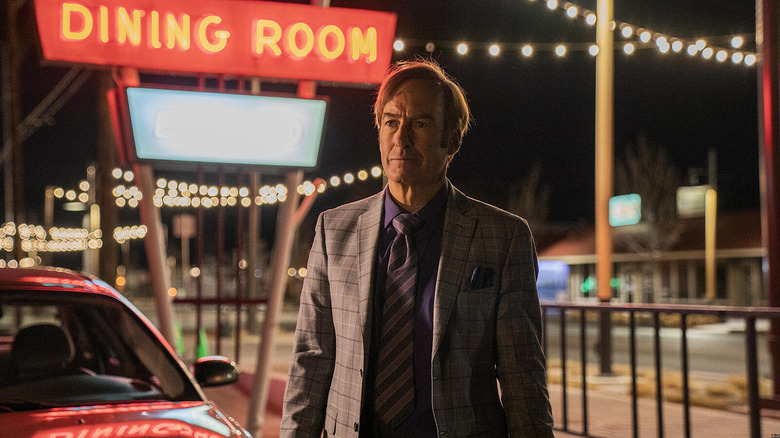
"Better Call Saul," which is currently airing its final episodes at the time of this writing, has always been a show with extreme attention to detail. Creators Vince Gilligan and Peter Gould have taken advantage of the shared universe of "Better Call Saul" and its critically acclaimed forebearer "Breaking Bad." What's more impressive is that a spin-off show is of the same caliber, if not better, than its predecessor. The incredible tension, drama, and character work of "Better Call Saul" has helped to make the show progressively better each season. Moreover, its connection to "Breaking Bad" and the six years that it takes place before that show occurs helps to create an exciting through-line that eagle-eyed viewers can pick up on if they're paying attention.
From locales to characters and even props, the world of "Better Call Saul" is deeply meshed with "Breaking Bad." In case you want to get caught up with every "Breaking Bad" reference in "Better Call Saul" ahead of the final episodes, we've compiled a spoiler-filled list of every connection, storyline, and character that crosses over from the world of "Breaking Bad." Get comfortable, grab a bucket of Los Pollos Hermanos, and check out all the "Breaking Bad" references in "Better Call Saul."
A Cinnabon In Omaha
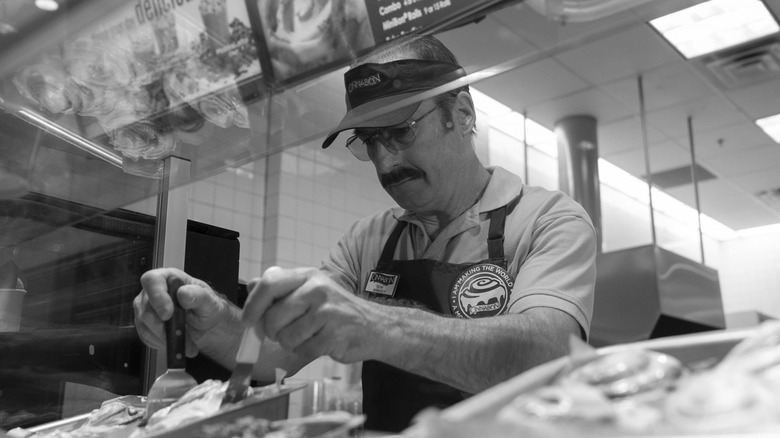
The earliest "Breaking Bad' reference in "Better Call Saul" comes from "Uno," the first episode of the series. The opening, shot in black and white, depicts Saul Goodman living life as "Gene," a manager of a Cinnabon in Omaha, Nebraska. Saul's new life as Gene is a reference to his line to Walter White in the final season of "Breaking Bad," in which Saul begins to get ready to disappear, saying his best-case scenario is "managing a Cinnabon in Omaha." The opening flash-forward sequence of "Better Call Saul" shows us that's exactly where he ends up, with each season of the spin-off series (save for season 6) opening with a little black and white look into Saul's life on the lam as Gene.
Saul's life as Gene in Nebraska plays a pivotal role in the opening of each season, making it just one of the many loops that still need to be closed in "Better Call Saul's" final season.
Heisenberg's Wardrobe
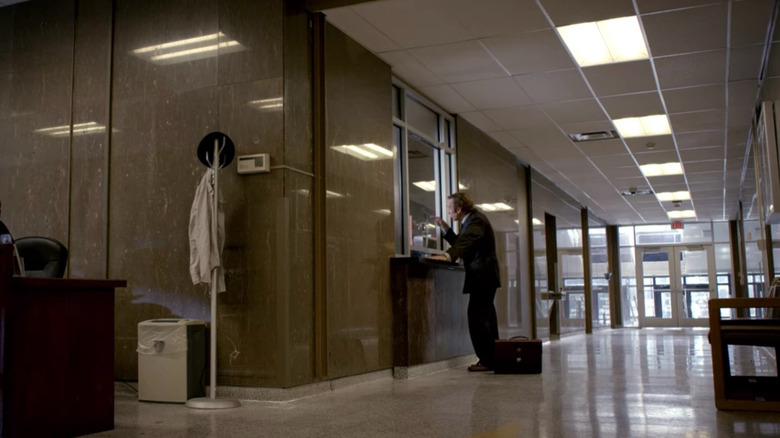
Another early reference in the show also comes from the series premiere, as eagle-eyed viewers can see the iconic Heisenberg outfit in the season 1 premiere. In the courthouse where Jimmy McGill does his public defender work, a coat rack can be seen in the background with the traditional Heisenberg windbreaker and pork pie hat hanging off of it. It is a blink-and-you-miss-it moment that's a tribute to the now-classic show that started it all. While Walter White hasn't shown up in the show yet, we can take comfort in the fact that his signature look still has some small presence in the series.
Day Spa & Nail
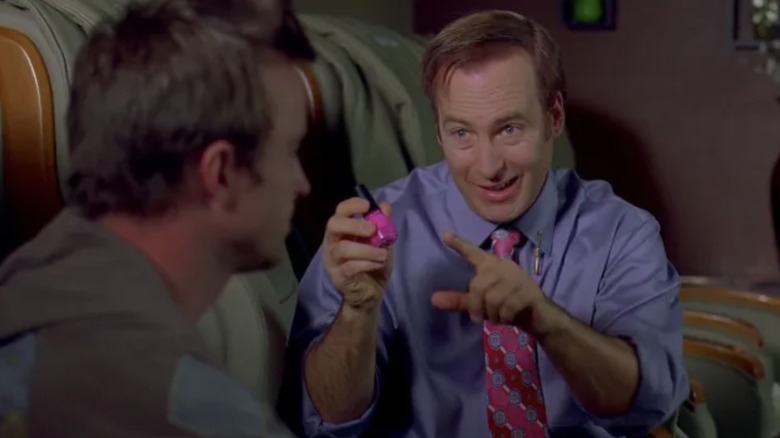
In the list of locales that transfer over from "Breaking Bad," this is one of the less significant ones, but a reference nonetheless. "Day Spa & Nail" is a location where Jimmy uses the storage room as the base of operations for his law office. The nail salon business harkens back to "Breaking Bad," where Saul attempts to convince Jesse to launder his money through a nail salon. Saul Goodman seems to be a huge advocate for these types of locations, and although this isn't the same nail salon in "Breaking Bad," it can be perceived as a sort of nostalgia for where the criminal lawyer first started.
Loyola's Family Restaurant
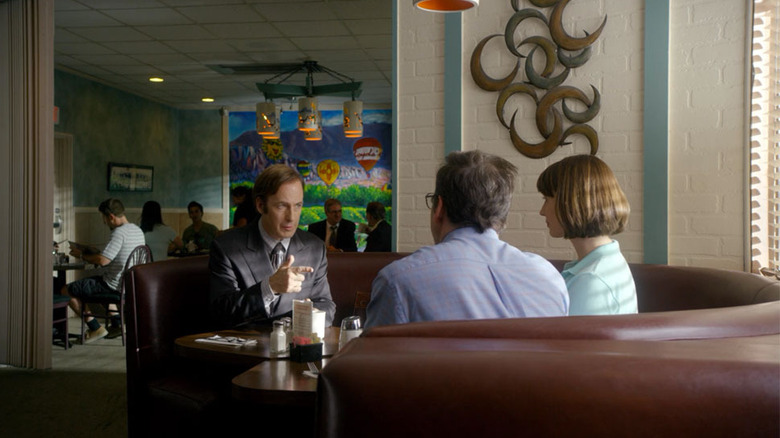
Loyola's family restaurant is another locale re-introduced in season 1 of "Better Call Saul." The restaurant was first featured in "Breaking Bad" as the first meeting place between Jesse Pinkman (Aaron Paul) and Gus Fring (Giancarlo Esposito) in season 4, episode 6 of the original series. Jimmy and his clients used the diner later (or should I say before?) in "Better Call Saul," and it would also become a meetup spot in the spin-off series, mainly for Mike Ermenthraut, who frequents the diner in both series. Since both shows take place in Albuquerque, it only makes sense that there would be overlap in some of their backdrops.
Jesse Pinkman Grafitti
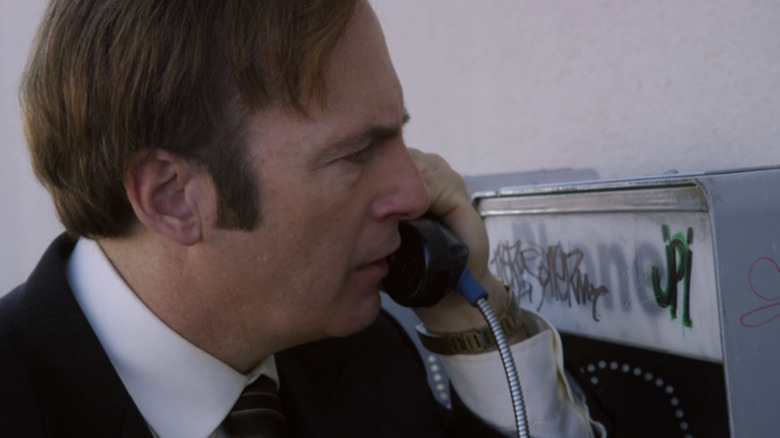
In season 1, episode 3 episode of "Better Call Saul" titled "Nacho," Jimmy waits anxiously by a pay phone to contact the threatening Nacho, whom he inadvertently got arrested in that same episode. Another blink-and-you-miss-it moment, Jimmy's payphone to talk to Nacho has layers of graffiti. Still, one particular tag is that of Jesse Pinkman's, featuring the initials "JP." An identical tag is featured on the walls of Jesse's house in "Breaking Bad" season 4, episode 7. It's good to know that in the early 2000s ABQ, Jesse Pinkman was tagging telephone booths instead of focusing on his chemistry homework.
University Of American Samoa
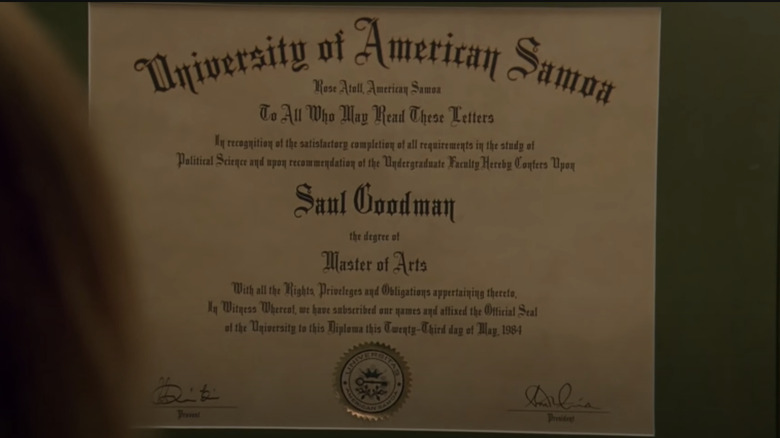
The "University of American Samoa" can be considered both a reference and a retcon, as its reappearance in "Better Call Saul" causes a bit of a contradiction to the degree that we see in "Breaking Bad." While the university name remains the same as "Breaking Bad," the original series shows the degree in Saul Goodman's name. In "Better Call Saul," the degree is referenced in a flashback sequence; however, it is mentioned that Saul earned it in his original name, Jimmy McGill. The show's remaining episodes could explain this contradiction. However, that seems unlikely.
Casa Tranquila
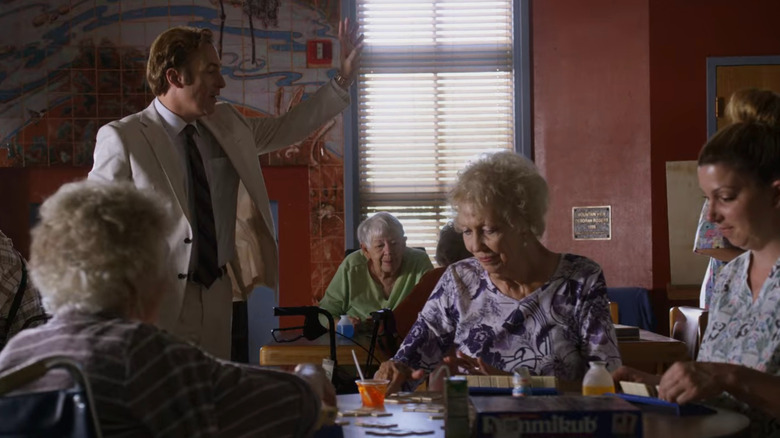
One of the most significant references comes early in "Better Call Saul," when Jimmy (before he becomes Saul Goodman) decides to try out Elder law in season 1. Where better to develop some clientele than "Casa Tranquila," a nursing home that would be blown up six years later by Walter White and Hector Salamanca in "Breaking Bad" to kill Gus Fring. While Hector isn't there yet (more on that later), seeing the locale in "Better Call Saul" feels like an ominous ode of things to come.
Ken Wins
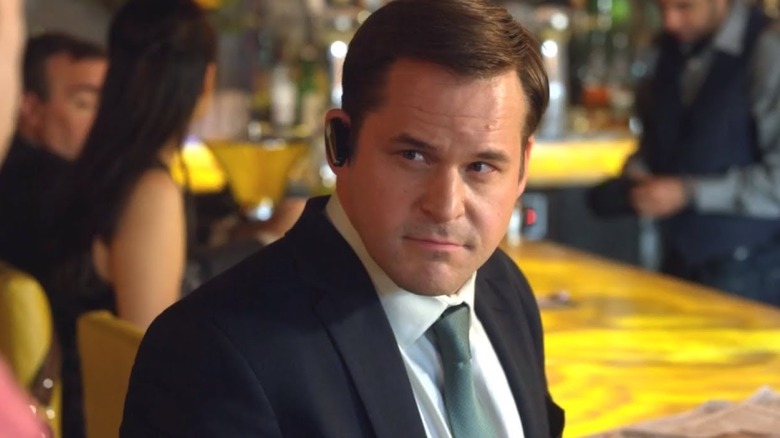
Don't let his license plate fool you. In the world of "Breaking Bad" and "Better Call Saul," Ken does nothing but lose. The character, portrayed by Kyle Bornheimer, makes a brief appearance in each show. Early in "Breaking Bad," season 1, episode 4, Walter White gets cut off in a parking lot by Ken and waits behind him in a line at a bank while Ken speaks on the phone obnoxiously loud through his Bluetooth earpiece. Walt runs into him again at a gas station, as his cringe-worthy "Ken Wins" license plate is pretty unmistakable. Walt, spurred by the life-changing news of his cancer, sets the stockbroker's car on fire, much to Ken's misery.
Ken returns in "Better Call Saul" Season 2 Episode 1 "Switch," being at the same hotel Jimmy is relaxing in at the time. Jimmy and Kim (Rhea Seehorn) pull a con on the stockbroker, getting him to buy them an expensive bottle of tequila. Yet again, making Ken the loser, contrary to his license plate. The tequila bottle also happens to be a reference in and of itself, with his particular brand previously making an appearance in "Breaking Bad."
Zafiro Añejo
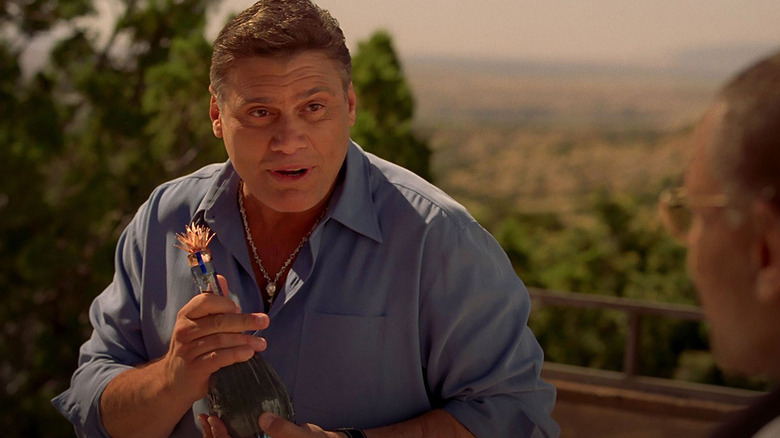
As mentioned above, the tequila bottle purchased by Ken is another critical yet subtle reference to "Breaking Bad." The bottle of tequila called "Zafiro Añejo" is the same kind of bottle Gus Fring gifts to Don Eladio, head of the Salamanca cartel, as a ruse to poison him and all of his associates. The bottle that Jimmy and Kim con Ken into buying for them becomes significant in its own way as well, as it's representative of their relationship, with Jimmy holding onto the bottle top as seen in Season 6 of "Better Call Saul," which opens on Saul Goodman's house being torn apart by authorities. The bottle top of the tequila is revealed as still being in his possession. It should also be noted that "Zafiro Añejo is not a real spirit brand. Fictional brand synergy is consistent in the "Breaking Bad" universe, and we're absolutely here for it.
Fring's Back
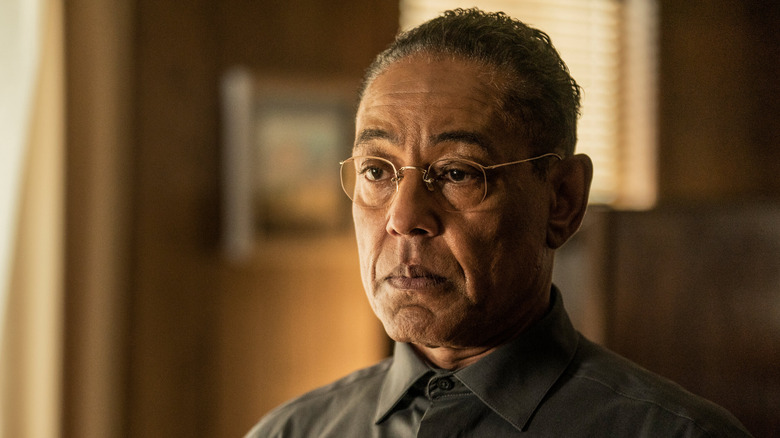
One of the most popular easter eggs comes from "Better Call Saul," season 2, which features ten episodes, each with a distinct title. Interestingly, re-arranging the first letter from every title will spell the phrase "FRING'S BACK." It's an ominous tease of the character's re-introduction in season 3 of "Better Call Saul," as Giancarlo Espositio would return to the role of Gus Fring in season 3 of the show and become a recurring character in the series. "Breaking Bad" fans will also recognize members of Gus Fring's organization, Victor and Tyrus Kitt, who also return in "Better Call Saul."
Tuco Salamanca's Prison Stint
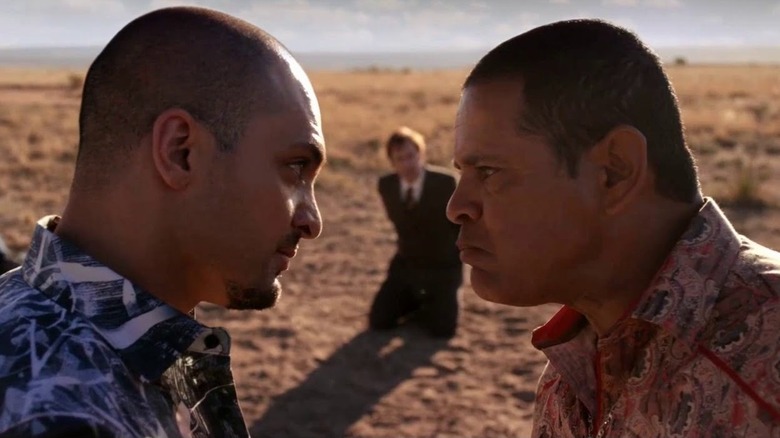
In "Breaking Bad," Tuco Salamanca serves as one of the first significant antagonists of the series. Fresh out of prison, Tuco beings dealings with an early career Heisenberg and Jesse, going so far as attempting to kidnap them and take them back to Mexico to cook for him there. One of the best parts of "Better Call Saul" is its almost obsessive need to fill every gap in the timeline, including explaining Tuco's prison stint.
The storyline comes in season 2 of "Better Call Saul," with Mike and Nacho conspiring against Tuco, goading the temperamental Salamanca into beating Mike to a bloody pulp, leading to his arrest. It's the last time we see Tuco in the series, with the character in prison until his eventual release when the events of "Breaking Bad" roll around. Viewers also see the return of two of Tuco's goons from "Breaking Bad," named No-Doze and Gonzo. No-Doze would meet his end at the hand of Tuco, who beats him to death in "Breaking Bad," which is alluded to in season 1, episode 2 of "Better Call Saul."
Ignacio
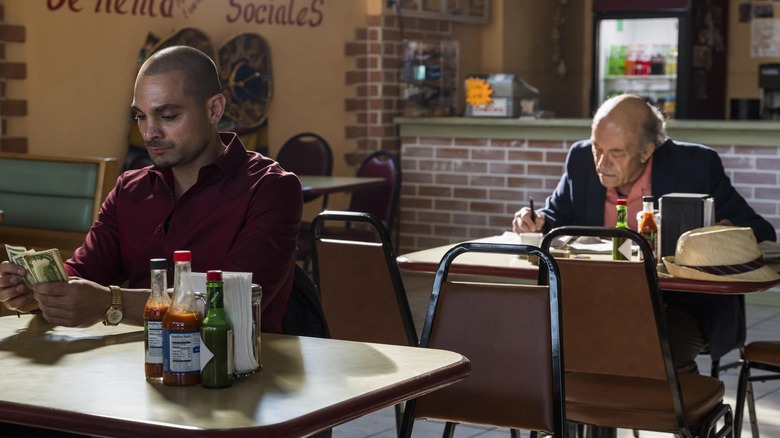
In season 2, episode 8 of "Breaking Bad," aptly titled "Better Call Saul," Walter and Jesse kidnap Saul, holding him at gunpoint. The criminal lawyer desperately calls himself "amigo del cartel" (friend of the cartel) and begs for his life, blaming "Ignacio" and asking if "Lalo" is responsible for this. It's a hilarious moment showing Saul's experience with seedy clients that are quickly brushed off and never mentioned again in the series. However, in "Better Call Saul," these two brief name drops are turned into two of the most engaging characters of the sequel/spin-off series.
Nacho would become one of the leading players of "Better Call Saul." Michael Mando's subdued and intense performance turns Nacho into a tragic character. Nacho, attempting to protect his father and their business, tries to undermine the Salamanca cartel at every turn. He is even responsible for sending Hector Salamanca into his wheelchair. Eventually, Nacho meets his end on his own terms in "Better Call Saul's" final season, as the character is nowhere to be seen in "Breaking Bad." It's incredible how a single name drop from a previous series can spawn such a vast and tragic multi-season character arc in a spin-off. The character of Ignacio Varga is a testament to the brilliance of the "Better Call Saul" writer's room.
Lalo
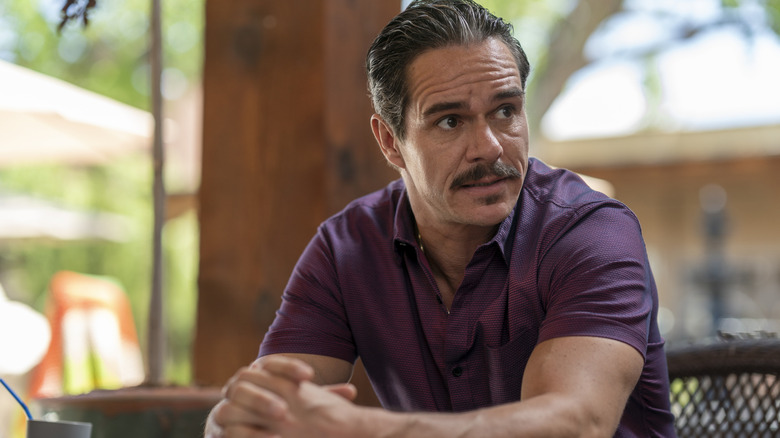
On the other side of the spectrum from the original "Breaking Bad" namedrop mentioned earlier is Lalo Salamanca (Tony Dalton), a "fixer" for the Salamanca Cartel. Played by the charming Tony Dalton, Lalo's mission in "Better Call Saul" is to expose Fring and his plans for a secret meth superlab. Lalo is a critical opposition to Gus Fring in "Better Call Saul" and is a character that showcases a perfect balance of intensity and charm, as Dalton oozes charisma in the role despite his frightening actions and behavior in the series. Dalton's turn as the character made one throwaway line into one of the essential characters in the latter half of seasons of "Better Call Saul."
Don Eladio Goes For A Swim
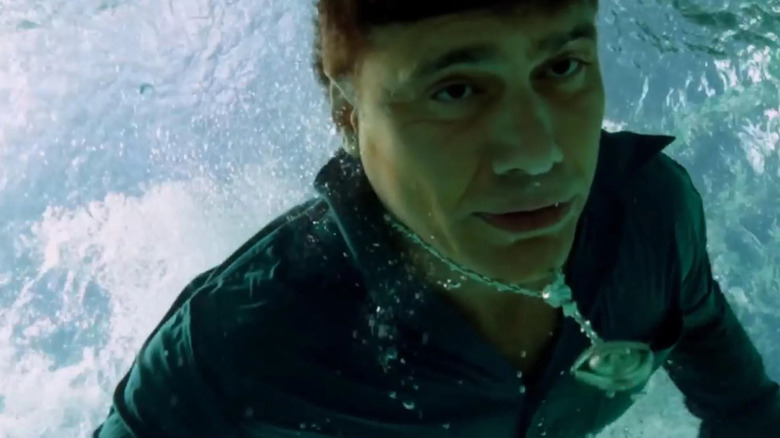
A subtle reference to the character's fate, "Better Call Saul" season 3, episode 4 features Don Eladio jumping into his pool. The imagery is reminiscent of his death in "Breaking Bad" after being poisoned by Gus Fring, with his diving and the camera's position underwater being a near mirror to how his death was filmed in "Breaking Bad." It's chilling imagery to those that recall his death and the massacre that followed it.
Krazy 8
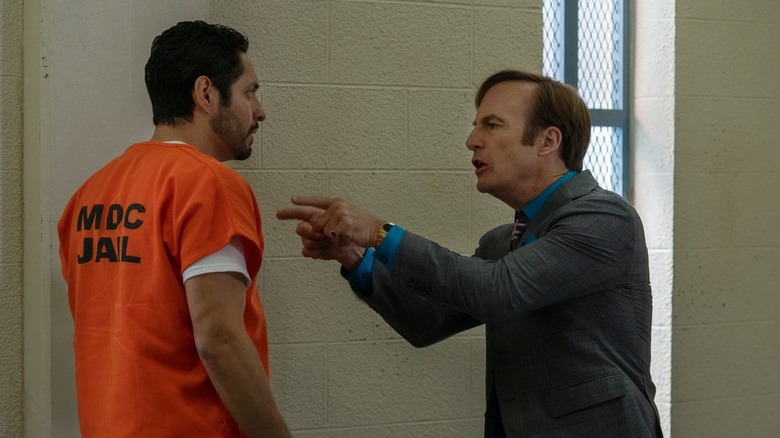
Krazy 8 (Maximino Arciniega), also known as Domingo Molina, is one of the first people that Walter White murders. Krazy 8's death is a starting point for Walt's career as Heisenberg. This first murder Walt commits would set him on that path of, to quote Vince Gilligan, "Mr. Chips to Scarface." Krazy 8, only known as Domingo in "Better Call Saul," starts as a lower-level associate of the Salamanca's, given his name "Krazy 8" by an offhand comment from Lalo Salamanca during a card game. Krazy 8's start as an informant in "Breaking Bad" would originate in "Better Call Saul," with his arrest by some familiar DEA faces...
Hank Schrader And Steven Gomez
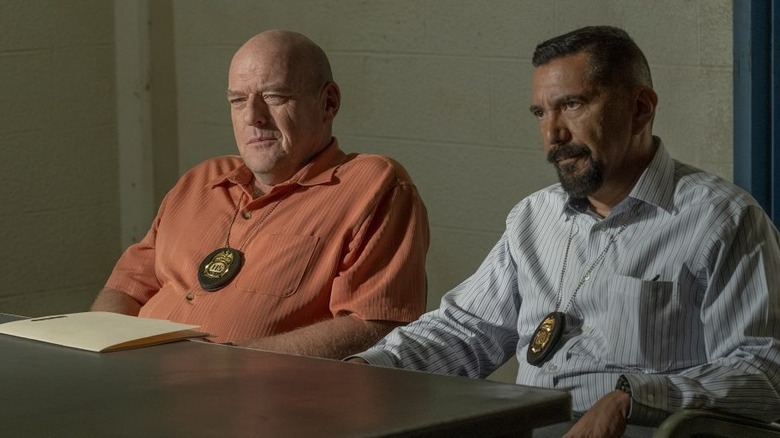
Hank Schrader (Dean Norris), one of the most notable characters from "Breaking Bad," returns in "Better Call Saul" Season 5 along with partner Steve Gomez (Steven Michael Quezada). The two are responsible for the arrest of Krazy 8 and meet Saul Goodman for the first time as Goodman is representing Krazy 8, and thus makes a Deal with Hank and Gomez. Krazy 8 becomes the informant that we meet in "Breaking Bad," with Hank and Steve's arrival so late into "Better Call Saul," reminding audiences just how close we are to the "Breaking Bad" timeline and that "Better Call Saul" is coming to an end.
Hector Salamanca And The Salamanca Twins
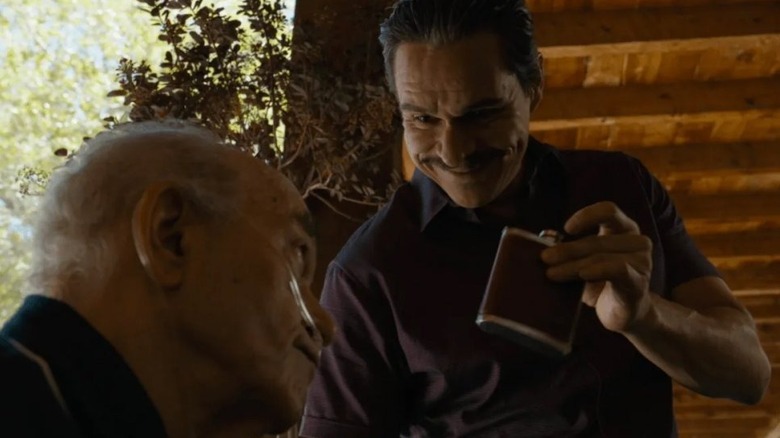
The Salamanca's are significant players in both "Breaking Bad" and "Better Call Saul." The seeds of their inevitable downfall are planted in the prequel series, which sees Hector Salamanca before his signature wheelchair and bell. Hector is drugged by Nacho in "Better Call Saul," leading to his being hospitalized from a stroke and later put into Casa Tranquila. A place he'll remain until his, ahem, explosive exit in "Breaking Bad." Hector's bell that he uses to communicate is also explained in the show, as it's gifted to him by Lalo in season 4, episode 9 of "Better Call Saul."
Moreover, the intimidating Salamanca twins shine a bit more in "Better Call Saul" as well, making an enemy in Mike Ehrmantraut, resulting in Mike's partnership with Gus Fring. Their actions and enforcers in "Better Call Saul" would pave the way for their violent methods in "Breaking Bad."
Ira From Vamanos Pest
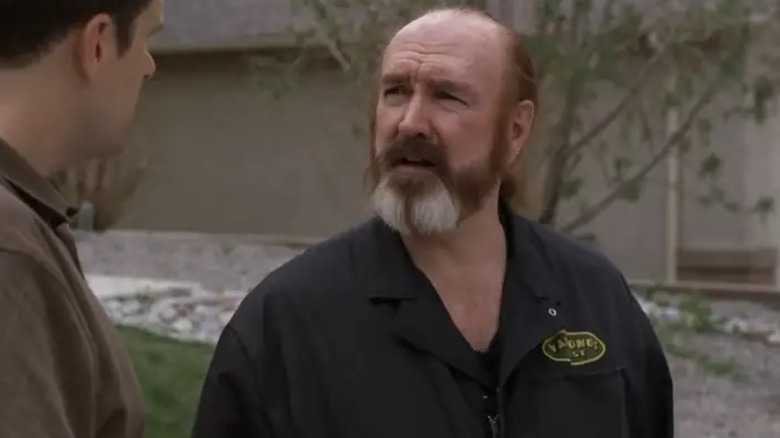
Another character pulled from the "Breaking Bad" grab bag of side characters, the character Ira (Franc Ross), shows up in season 4 of "Better Call Saul," hired by Saul to steal a figurine from a company that he had just interviewed with earlier in the episode. Ira is a one-and-done character in both shows, but it's interesting to note in "Better Call Saul," Ira is a small-time crook. His return in season 5 of "Breaking Bad" is as part of the "Vamanos Pest" crew that Walt and Jesse use as a cover to cook meth. Ira moves up the criminal ladder ranks between the two shows.
The Dog House
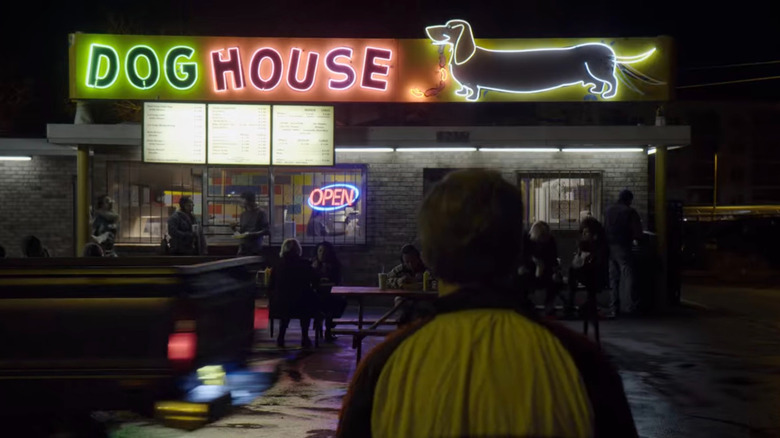
A hot dog stand featured in "Breaking Bad" this locale is used for several character interactions in both shows. The Dog House is also at the center of one of "Better Call Saul's" hyper-stylistic montages in season 4, episode 5, as Saul sets up shop at the dog house for his cell phone business. Jesse gets his own scene at the dog house in "Breaking Bad," albeit purchasing a firearm instead of a cellphone.
Francesca Liddy
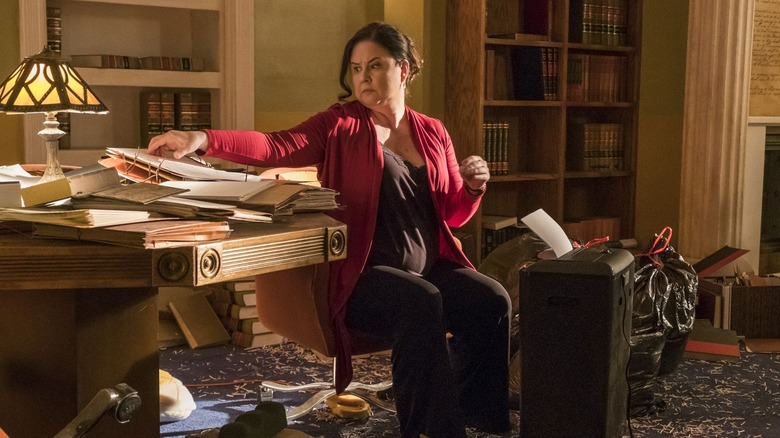
Saul Goodman's jaded secretary in "Breaking Bad," Francesca (Tina Parker), starts as cheerful and optimistic when she first crosses paths with Jimmy McGill. Hired to be a secretary in Season 3 for Jimmy and Kim's shared office space, Francesca represents a more prominent recurring theme in both shows: the slow fade of optimism and innocence into jaded corruption and moral ambiguity.
Seeing Saul's secretary grow disillusioned and bitter as the series goes into its final season helps to remind viewers that this is just the beginning of Saul Goodman's descent into becoming a criminal lawyer.
Gale Boetticher
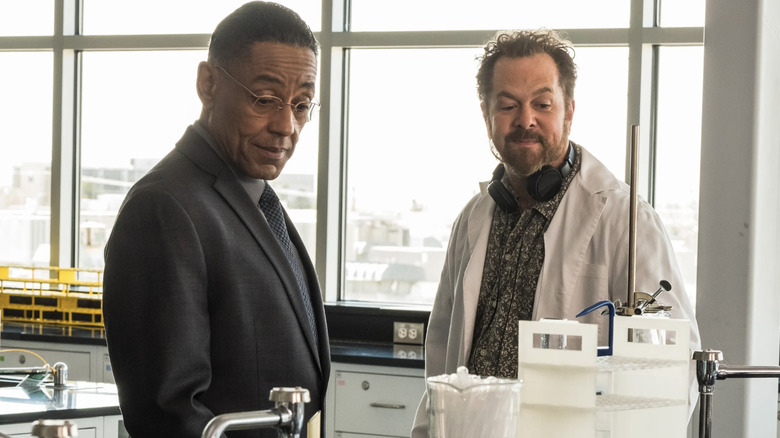
Gale Boetticher (David Costabile), Gus Fring's prized pupil and savant chemist, returns as the eccentric potential cook for Gus Fring in season 4 of "Better Call Saul." His return is brief, as he shows some samples of meth of varying purity before asking Gus to let him cook for Fring in his lab finally. "Breaking Bad" enthusiasts might also pick up on Gale's notebook in his brief scenes, which is the same one that becomes an integral part of Hank Schrader's discovery of Walt as Heisenberg. Gale would, unfortunately, meet his end at the hands of Jesse Pinkman in "Breaking Bad," who shoots Gale to protect Walt.
Lydia, Madrigal, And The Industrial Laundry
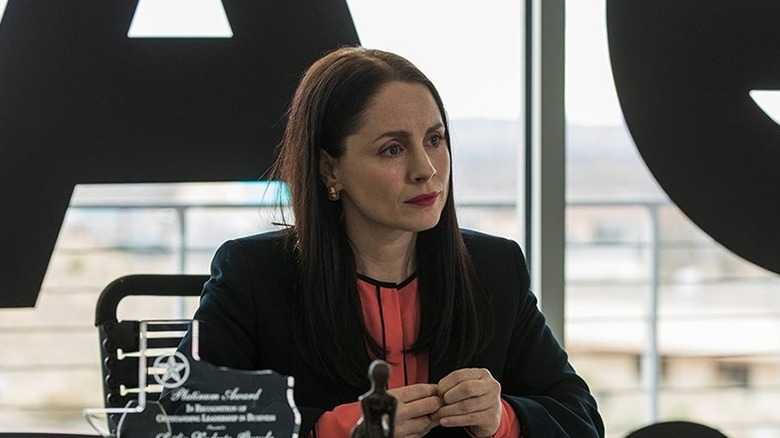
The whole origin of Gus Fring's massive operation in "Breaking Bad" is a crucial aspect of the latter half of "Better Call Saul," as seasons 3 and 4 of the show re-introduce familiar names and faces from "Breaking Bad." One of those faces is Lydia, an employee of "Mardigral," a company introduced in "Breaking Bad" that involves Los Pollos Hermanos and the methylamine distribution that fuels Fring's meth-cooking. Lydia is introduced to the criminal enterprises of Gus Fring as she helps Mike receive a cover job at Madrigal in the security department.
Most importantly, Lydia is revealed as the character that facilitates Gus Fring's purchase of industrial laundry, one that would become the cover for his meth superlab that is integral to "Breaking Bad." You'll notice a recurring pattern that, as "Better Call Saul" gets closer to the end of its six-season run, the closer the show gets to the "Breaking Bad" timeline.
Ed The Disappearer
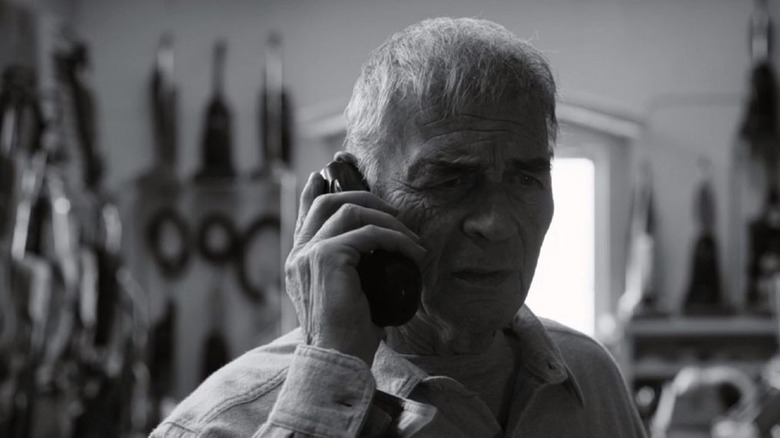
One of the later references to "Breaking Bad," the late and great Robert Forster's character, appears in a black and white flash-forward sequence in Season 5. Gene, being recognized by an eerie cab driver, calls Ed the Disappearer in a panic. Speaking strictly in vacuum repair code, we get brief looks at Robert Forster, who filmed this scene while also filming for another "Breaking Bad" project, "El Camino." The appearance harkens back to his time on "Breaking Bad," in which Ed also helped Walt disappear with a new identity. Walt, unfortunately, throws it all away in favor of returning to Albuquerque to save Jesse, kill some nazis, and get money for his family.
All of these characters, locations, and props have their role to play in "Better Call Saul," being more than just easter eggs and references. Each serves a larger purpose in making one interconnected story. "Better Call Saul" created a delicate balance of "Breaking Bad" connections that are fun to point out and serve the story and characters, and even at times create entirely new characters from the references to help make its story more engaging.
Read this next: The 19 Greatest Movie Couples Of All Time Ranked
The post Every Breaking Bad Reference in Better Call Saul (So Far) appeared first on /Film.
